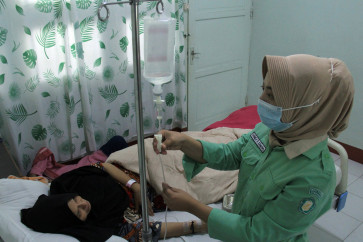Drug prevention starts at home: Foundation
Early parental intervention is the most crucial factor in preventing children from becoming drug addicts, experts say
Change Size

Early parental intervention is the most crucial factor in preventing children from becoming drug addicts, experts say.
"Between 80 and 90 percent of children use drugs for the first time at home, when their parents are actually there," said Veronica Colondam at the launch of her book, Raising Drug-Free Children, on Saturday.
Veronica founded Yayasan Cinta Anak Bangsa (YCAB), or Loving the Nation's Children Foundation, in 1999.
She said six out of 10 drug addicts take drugs at home, while most drug addicts -- 60 to 70 percent -- come from what they perceive as a good family background.
"Don't wait until the child becomes a teenager (to look out for drug use). The sooner, the better," she said, adding 12 to 17-year-olds are the most likely to experiment with drugs.
In the YCAB 2004 survey, published on www.ycab.org, one in every 10 respondents in Jakarta admitted to using marijuana. Two in 100 said they took ecstasy, one in 125 used cocaine, three in 100 used crystal methamphetamine and two in 100 used another kind of drug such as low-grade heroin.
"Oddly though, most people here do not seem to care and do not want to interfere. Parents only realize how serious the drug problem is when their own child becomes an addict," psychologist Paulus Hartanto, also at the book launch, told The Jakarta Post.
"There is a tendency in most families to regard drug addiction as a problem that happens to other children, but not their own," he said.
Veronica said communication is a problem.
"Parents are usually the last to know about their child's addiction. Most addicts tell their friends about their problems first," she said.
According to Veronica, open communication between parents and their children is the most important factor in preventing children from using drugs.
"Simple things, like eating five meals a week together as a family or spending at least 15 minutes per day with each child, can drastically reduce your children's risk of experimenting with drugs," she said.
Openness also enables parents to monitor their children's activities and learn more about who their children spend time with, thereby minimizing the risk of the children using drugs.
Data from the National Narcotics Agency (BNN) show 15 to 24-year-olds are the most susceptible to drug abuse.
About 7 percent of children between the ages of 12 and 19 admit to having tried drugs at least once. One in four will continue to use drugs and end up as addicts.
Of the 672 drug addicts involved in one rehabilitation program, the majority said the most critical time when they began to use drugs was between the ages of 13 and 15.
Veronica said it was important to set boundaries in a child's life.
"Parents cannot be either too authoritative or too permissive because that can make the child confused or feel unloved, as well as lose their sense of security."
According to BNN, about 3.2 million Indonesians -- between 1 and 1.5 percent of the population -- are drug addicts.
Veronica said many parents reacted angrily when they learned of their child's addiction.
"That's wrong. Parents must not alienate a child addict.
"They need to support their child no matter what, even if it takes years for them to be totally cured," she said.









